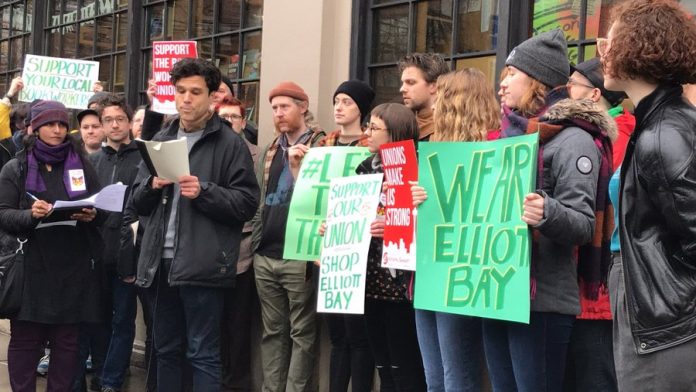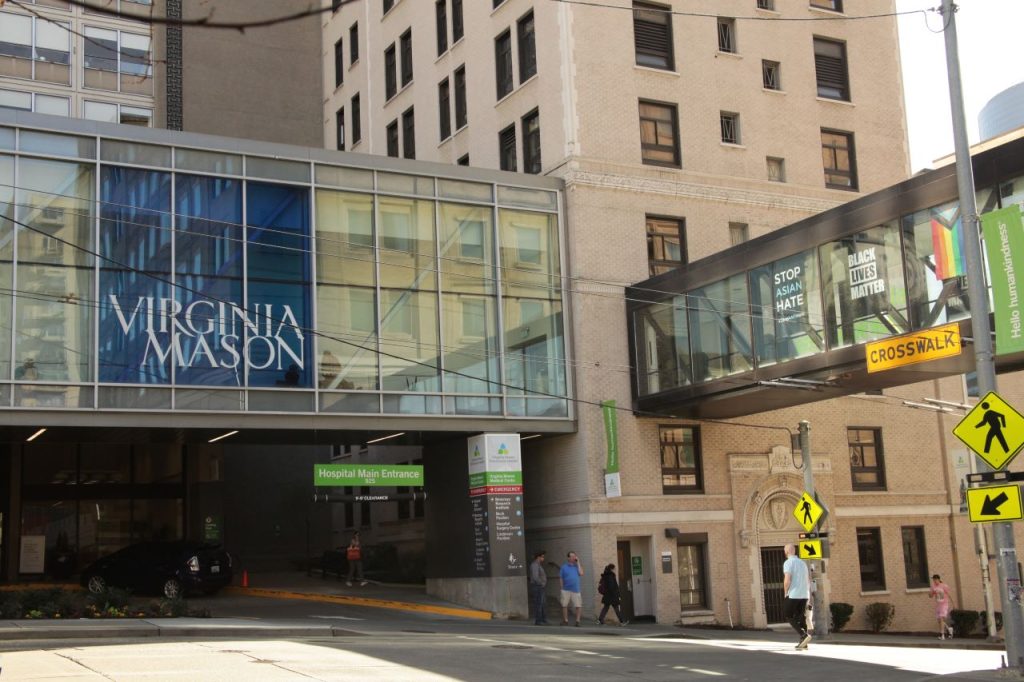
2023 was a banner year for union organizing, but much work remains in 2024.
2024 marks the 25th anniversary of the World Trade Organization protests, commonly called “the Battle of Seattle,” an important AFL-CIO-led protest for worker rights and anti-globalization.
The quarter-century anniversary has seen an important spark for union and labor work in the city, as organizations across public and private sectors carry their work forward.
The U.S. Bureau of Labor Statistics tallied 33 major work stoppages that started in 2023, indicating this was the largest national labor movement since 2000. Multiple campaigns to unionize or strike garnered national attention, including SAG-AFTRA, which represents 160,000 media professionals, such as screenwriters.
Following these developments, the AFL-CIO released new polls on August 29, 2023, showing support for union work across ages and political lines. 88% of people under 30 view unions favorably. 71% of Americans support unions, majorities being Republicans and Independents.
Subsequently, 2023 was named the Year of the Union by NPR.
2024 looks no different, as workers across industries are working on unionizing and bargaining for new contracts. Union leaders around Seattle and King County are looking to use their organizations for transformative change.
“Our interests as workers and the interests of the general public are aligned and we can fight together to be able to transform our workplaces, our industries and ultimately all of our lives,” said Katie Garrow, Executive Secretary and Treasurer for MLK Labor, the central body of labor organizations in King County representing more than 150 unions and 100,000 workers.
A new labor movement
This national movement in worker’s rights and labor mobilization has not left Seattle behind. The city is seeing action in union formation, contract negotiation and coalition-building across all industries.
However, today’s labor front is shaping a different movement, inclusive of 21st century community issues.
Karen Estevenin, Executive Director for PROTEC17, said part of their union’s mission is to advance equity and build communities. “Our union does those things inside the workplace, but we also have this powerful vehicle, so to say, to drive real, positive change in our communities,” she said.
Estevenin said that’s something very unique about labor, having people from all different walks of life and backgrounds able to work towards greater good.
“You can even have people on different ends of the political spectrum, and yet they will come together over understanding that there needs to be dignity in the work, a livable wage, fairness in the workplace, an ability to correct injustice and it goes on and on,” she said.
PROTEC17 represents workers throughout all sectors of public service in Seattle.
The union is engaged in tackling issues of affordability, childcare, healthcare, transportation, the ability to live in the cities their members serve and any component that can further well-being in their communities. “These are all things that we’re really involved in and hoping to elevate beyond just wages and benefits in the workplace,” Estevenin said.
For example, Garrow said when healthcare workers fight for patient-to-staff ratios, or when teachers fight for more recess time and reformed disciplinary practices for Black and brown students so that they don’t end up in the school-to-prison pipeline, union work takes on larger societal issues.
On Jan. 15, 2024, healthcare workers at Virginia Mason Medical Center voted to unite in SEIU Healthcare 1199NW to “improve their working conditions and secure a seat at the decision-making table.”
SEIU 1199NW is a union of nurses and healthcare workers with over 31,000 caregivers throughout hospitals, clinics, mental health, skilled home health and hospice programs in Washington state and Montana.
“[The healthcare industry or education system] are places where we’re using security of a union contract, which is a legally binding agreement between an employer and its workforce and union, to be able to improve the conditions, not just for ourselves as workers, but also for the people who we serve and the general public,” Garrow said.
585 out of 765 voters supported joining 1199NW, according to the count conducted by the National Labor Relations Board. The union announced the election covers more than 1,000 frontline healthcare workers in Seattle.

“When a workplace becomes unionized, it changes the industry,” Garrow said.
Garrow mentioned workplaces like Starbucks, where baristas have unionized: as they win better conditions at work and better wages, their industry changes as a whole, because the rest of the industry will have to follow if they want to compete for talent.
“We, through unionization in our workplaces, transform industry and industries transform our whole community,” Garrow said. “I think that in a broader context, one of the best things that we’re doing is figuring out how to use collective bargaining agreements to fight for the common good.”

Rachel Ybarra, who led the campaign to unionize the first Starbucks location in Seattle and the West Coast, said that has been really powerful for not only building strength within their own stores but also getting folks interested in what unions can do and getting them involved.
“Sometimes that shift in perspective in seeing what [unions] have done for other people is what it takes for people to get invested,” Ybarra said.

Garrow acknowledged that workers face the risk of retaliation from their employers when unionizing becomes part of their workplace. Citing security reasons, Starbucks closed the Capitol Hill location on Broadway and Denny less than a year after Ybarra and their coworkers voted to join Starbucks Workers United.
Bargaining
Ybarra hopes this year marks the start of bargaining with Starbucks and that contract negotiations will be a transparent and open process for every person that it affects.
“Bargaining over Zoom is one of our most crucial demands because it’s really important that Starbucks workers around the country are able to participate in the making of their contract, this should not be kept to a single conference room in a hotel,” Ybarra said.
Key bargaining demands for Starbucks union members revolve around hours, hour cuts, scheduling, and the benefits that Starbucks has withheld from them.
“I cannot overstate the really horrible disruption that Starbucks cutting half of your scheduled hours can have on a person,” Ybarra said. “I’m not exaggerating when I talk about coworkers talking to me about receiving eviction notices because they haven’t been able to make enough to live.”
Ybarra has a number of coworkers dealing with food and housing insecurity.
“I have a coworker who is 16 years old trying to get health insurance and because Starbucks won’t guarantee her a consistent number of hours a week,” Ybarra said. “She isn’t able to get it because she needs to be able to work at least 20 hours a week.”
Hour and scheduling consistency has become a crucial demand for Ybarra and their coworkers, especially for the winter, when Ybarra said Starbucks usually cuts the hours their baristas work.
While Ybarra hopes they can start negotiations and reach a contract this year, they said “it would be incredible to see Starbucks give in on any of the things we’ve been talking about for two years or so.”
A study published in 2023 found that 43% of unions were still working without a contract two years after winning their election.
In the public service sphere, PROTEC17 was able to negotiate a tentative agreement with the city, which still needs to pass a vote through the council.
“We expect this to move through, we’re grateful to the mayor and to the mayor’s office for support on some of these key issues and we’re excited to have a contract in effect soon,” Estevenin said.
Estevenin said there were compromises on both sides but is hopeful the deal can address the most pressing issues facing Seattlites.
“What we were really hoping for, and I think we’ve achieved, is a fair contract, a good solid contract that provides equitable wages and benefits in this time that reflects the historic inflation that’s really grossly escalated the cost of living, particularly in the city of Seattle,” Estevenin said. “We’re excited to see it go through, we really feel that city workers should be able to live in the city that they serve.”
Inflation has hit Seattle hard, as the region recorded one of the highest inflation rates in the nation, estimated at 10.1% in 2022 according to WalletHub. Seattle has some of the most expensive housing, childcare, grocery, and transportation costs in the nation. PROTEC17 wanted to make sure that they had a contract that could make progress for members in those areas.
Racial equity, safety, pay and affordability, climate justice, and time (work-life balance) were amongst the priorities in PROTEC17’s demands. Estevenin emphasized that one of the key messages of the coalition was that “a thriving city starts with us.”
“When there are resources that are allocated to the people that are providing all of these important services, […] it’s really an investment in the communities,” Estevenin said.
While, if approved, the new contract with public workers will improve pay, the City of Seattle is headed toward a major budget reckoning with a deficit estimated at $230 million in 2025 and around $450 million in 2026. It could mean layoffs, as a new city council has stressed budget discipline and making cuts over raising new revenue. The City has been under a hiring freeze since January, except for police, fire, and community safety departments that have been exempt.
While the labor movement is picking up steam nationwide, that momentum has not translated into recent electoral success in Seattle. The city council shifted to the right in the last election, as a wave of business-friendly moderates won out. And the last mayoral election saw the labor-backed candidate, Lorena González, get trounced by business-backed Bruce Harrell. A less friendly city council and mayor could mean the labor movement is playing defense rather than offense in the city of Seattle in the near-term.
However, labor candidates and causes have shown more electoral strength elsewhere in the county, including in ballot measures raising the minimum wage in Tukwila and in Renton.
Beyond the contracts
Beyond contracts and bargaining on behalf of their members, unions are looking to find ways to bring further measures to the greater community. MLK Labor, for instance, has been focused on climate justice work that would tie into the Green New Deal.
Garrow said that work for them is about securing workers’ place in a clean energy economy and ensuring that in the transition off of fossil fuels, workers still have good quality jobs in new clean energy, whether it be in solar, wind, battery energy storage, retrofitting buildings, or building climate resiliency hubs.
“We want to ensure that all of those jobs are good jobs and that those jobs are available to all people, particularly those who have not had access to good jobs in the past, like immigrants, refugees, people of color, women, LGBTQ workers,” Garrow said.
By participating in the work towards climate justice and transitioning communities, unions are becoming a factor in the implementation of environmental measures. Ybarra said community wellbeing can also be a part of that.
When Ybarra started organizing at their first store two years ago, they remember talking about Starbucks having “high-incident” stores, which frequently means that a person that is homeless, or visibly poor, is having a mental health crisis in the lobby.
Ybarra said that is something they and their coworkers shouldn’t be expected to be responsible for. They said Starbucks could use its resources to hire social workers or otherwise do things within its community to help people.
“Working in high-incident stores really makes you realize that Starbucks has all of these resources and all this money that it isn’t putting towards its community,” Ybarra said. “Because if it was, our communities would look very different.”
Because unions shift the power dynamic in the workplace, Garrow said that despite the short term challenges, union work can be transformative on a personal level, but also societally formative.
“Women in unions earn 22% more than our counterparts who work in similar industries that are not union represented,” Garrow said. “Unionization can be a solution to things like the racial pay gap, the gender pay gap, the racial wealth gap, [unions] can help address and solve societal problems.”
Coalition-building beyond unions
MLK Labor hosts quarterly job fairs to fill all union jobs in King County, whether they be at the airport, in food service, health care, public service or construction. Working with Partner in Employment, a workforce development organization out of SeaTac that primarily serves immigrants and refugees, MLK Labor prepares candidates and helps them throughout the hiring process.
The effort aims to provide access to the union-protected positions for people who have traditionally been excluded from the prosperity and living wage that unions provide.
Garrow said the very best of union tradition stems from the civil rights movement, when unions joined with faith leaders and community organizations to fight for social change in this country.
“That’s what it’s gonna take to address the issues of racism, poverty, homophobia and sexism in our country,” Garrow said. “It’s going to take a large mass movement of all of us coming together and deciding we want the system to be different, that we reject the way things have been organized, the way systems have been organized in this country.”
Both Ybarra and Estevenin said their work within their union is closely tied to the work community organizations are doing around the city.
“Here in Seattle especially, we’ve done a lot of work with other community organizations and various community groups,” Ybarra said.
One of the things they’ve really appreciated about organizing in Seattle is the extent to which they’ve worked to build organizers in all capacities.
“We are building people who value their communities and who are willing to take responsibility for them and improve them,” Ybarra said.
Working alongside community organizations has been of great value to their union in developing its skillset and capacity to help organizers across the board. Ybarra said unions have “the potential to develop into community organizing, even beyond their capacity in workplace organizing.”
“When working people come together with a vision and a plan, there’s possibility and hope,” Estevenin said. “I believe and I know, a lot of my neighbors, friends, union members and people that live and work in the city of Seattle, believe that we can recreate the city that we all know and love.”
For Estevenin, this mission can be accomplished through broad organizing, with employers being a part of the equation.
“They’re at the table, definitely,” she said. “So they need to be part of the solution as well.”

Clifford Heberden
Clifford Heberden (he/him) is a freelance journalist focused on the environment, climate and justice. A French native, Cliff moved to Washington State to pursue his journalism degree and then began publishing articles with Salish Current. Now a Seattleite, Cliff accepts 70 degrees as sunbathing weather. His Twitter handle is @cliffbutonline.

